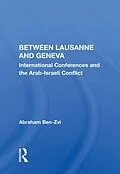This book analyzes the concept of an international conference as referred to by the major parties involved to resolve at least one facet of the Arab-Israel predicament. The restrictive type of conference has proved to be effective in resolving or stabilizing certain elements of the conflict.
Autorentext
ABRAHAM BEN-ZVI is professor in the Department of Political Science and a research fellow at the Jaffee Center for Strategic Studies, Tel Aviv University. In addition, Professor Ben-Zvi will become, in October 1998, the head of the Morris E. Ruriel Center for International Studies, Tel Aviv University. He is author of The Illusion of Deterrence: The Roosevelt Presidency and the Origins of the Pacific War and The United States and Israel: The Limits of the Special Relationship (Columbia).
Inhalt
Summary -- A Theoretical Framework: Presentation and Implementation -- In Pursuit of the 'Geneva Option': A Juxtaposition, 1985-1988 and Beyond -- Conclusions and Postscript -- Appendix 1 King Hussein Addresses Nation on Middle East Peace (background to international conference proposal), February 19, 1986 (Amman Television Service, February 19, 1986, in FBIS MEA, no. 34, February 20, 1986) -- Appendix 2 The Provisions of the April 11, 1987 London Accords (quoted from Israeli Foreign Minister Shimon Peres' United Nations Address, September 29, 1987) -- Appendix 3 The February 1988 American Peace Plan (text of the letter which Secretary of State George P. Shultz wrote on March 4 to Prime Minister Yitzhak Shamir of Israel outlining the American peace proposal. A similar letter was sent to King Hussein of Jordan. Quoted by The New York Times, March 10, 1988) -- Appendix 4 The Soviet Proposal for a Middle East Settlement, July 29, 1984 (Pravda, July 30, 1984, FBIS SOV, no. 147, July 30, 1984)
